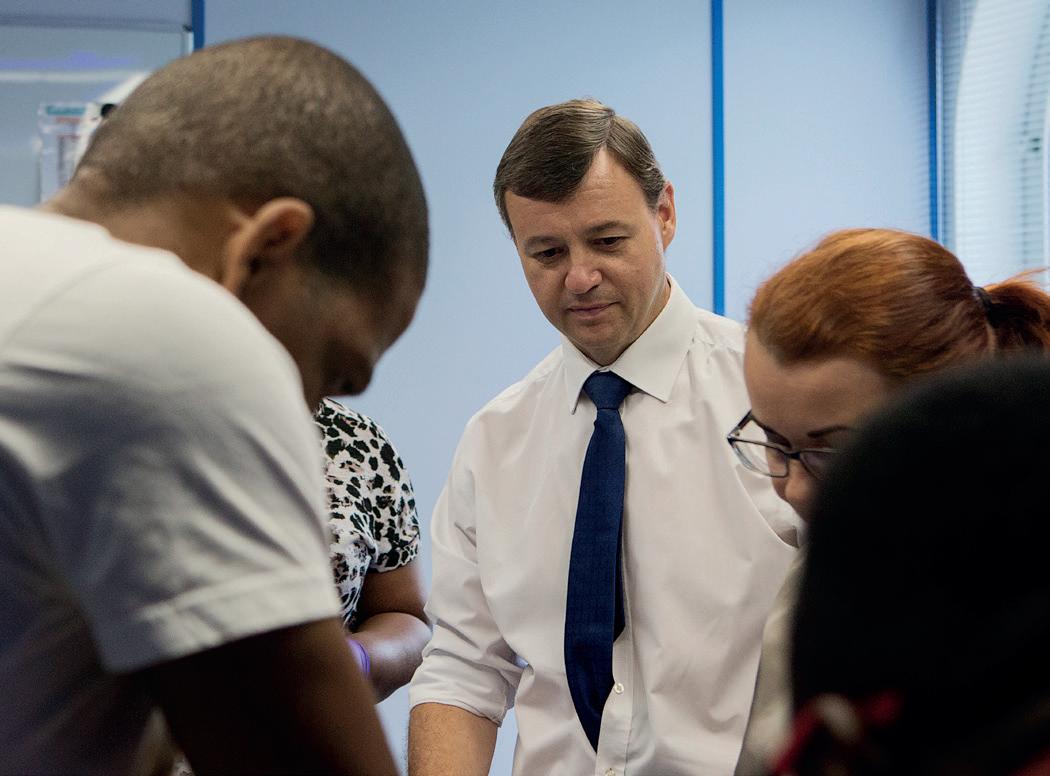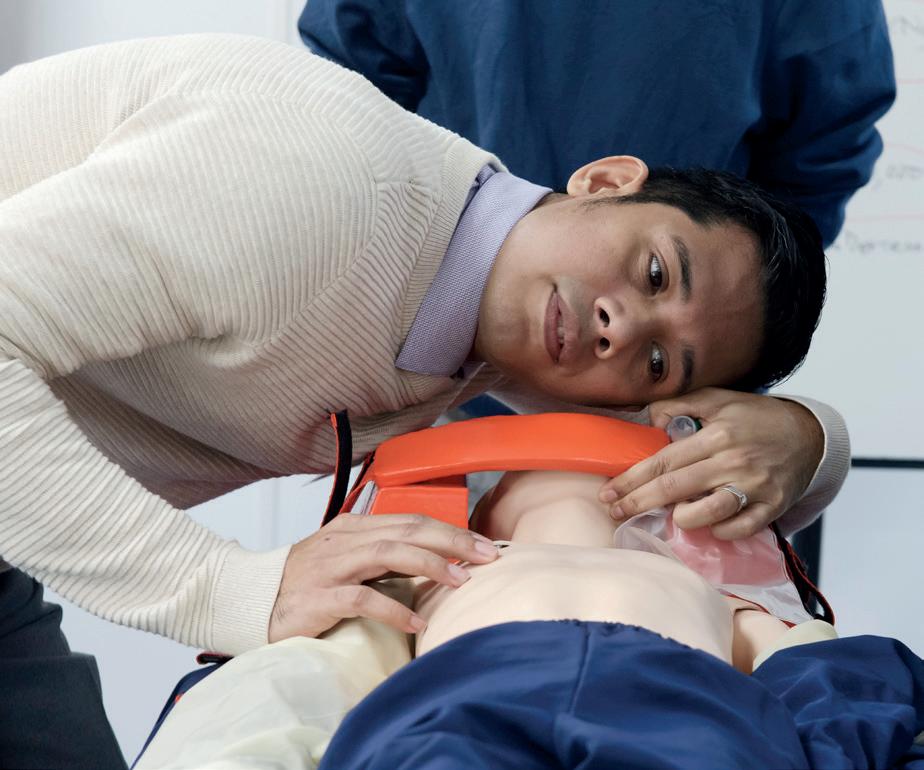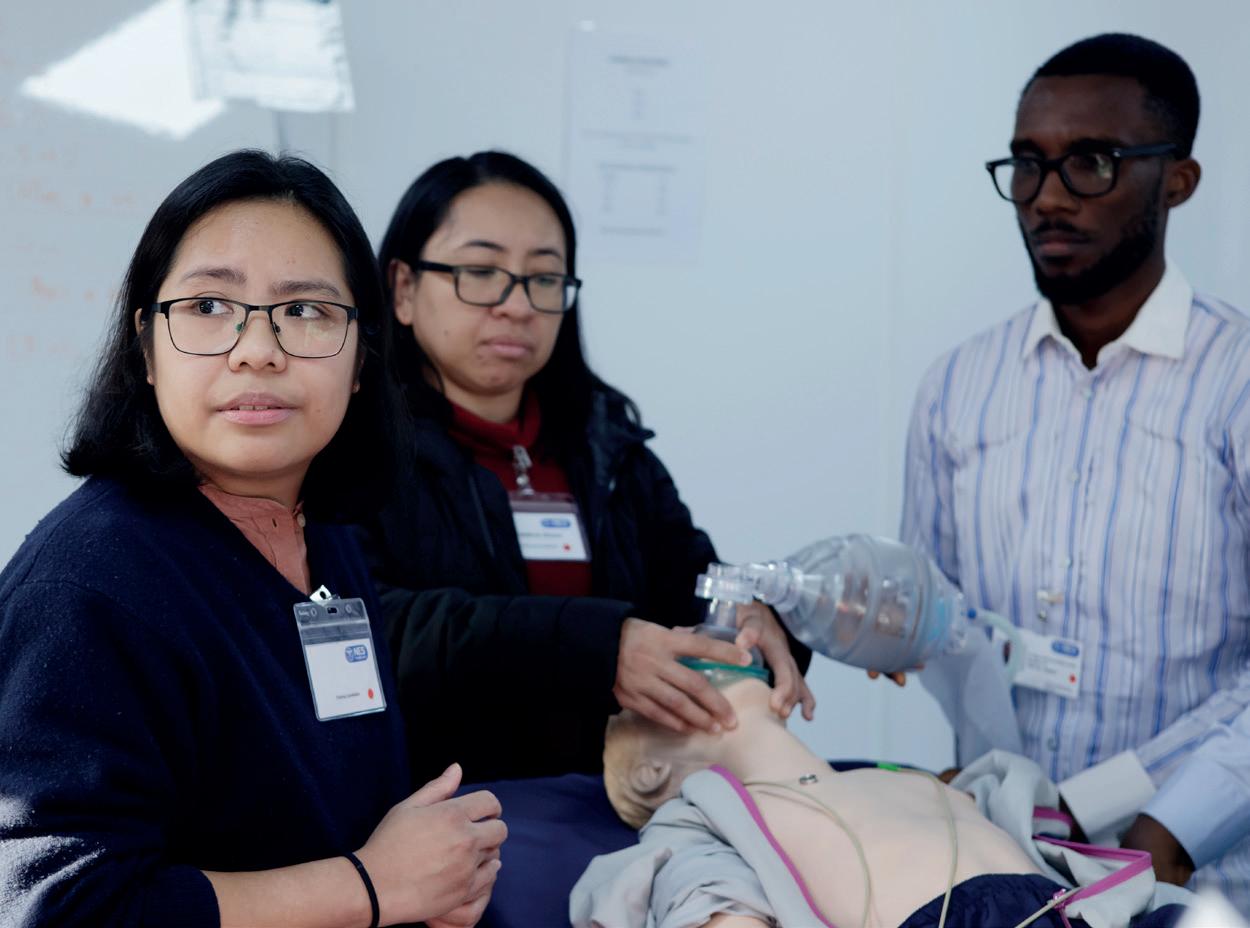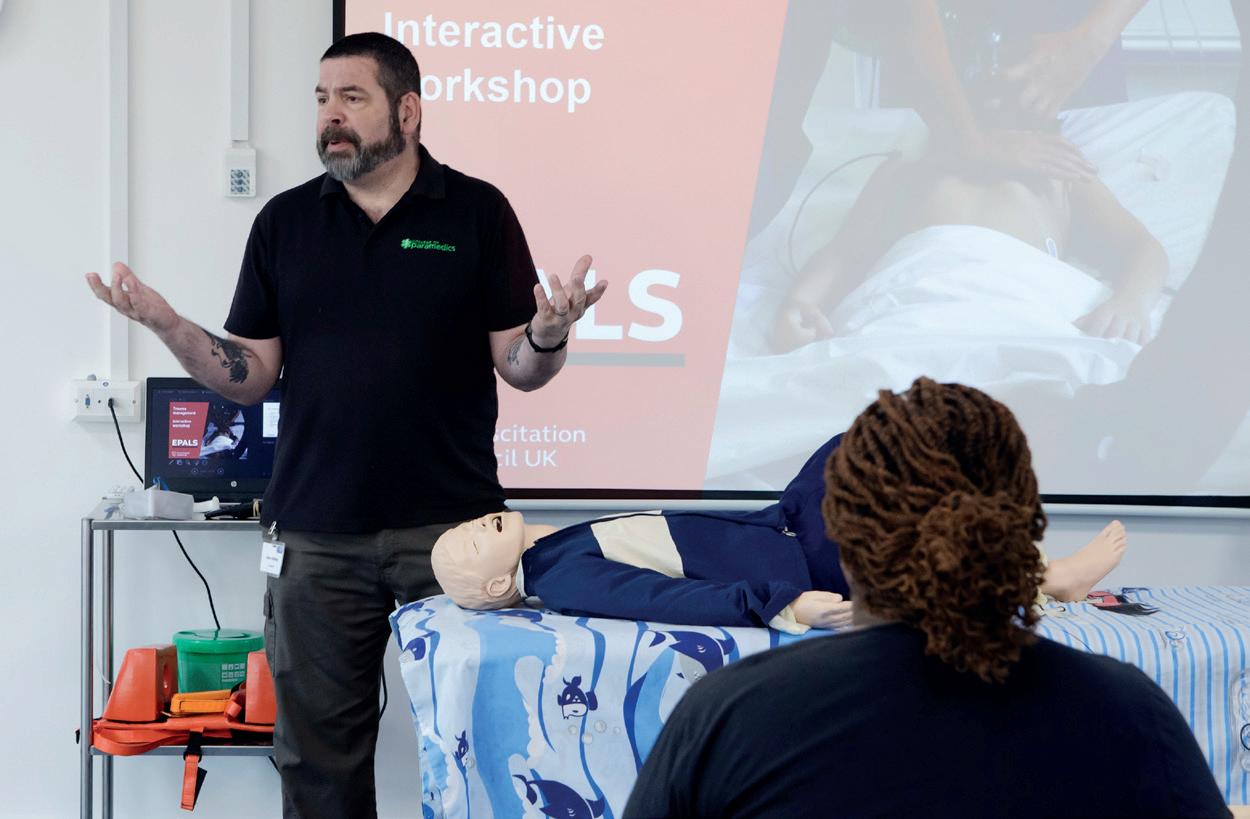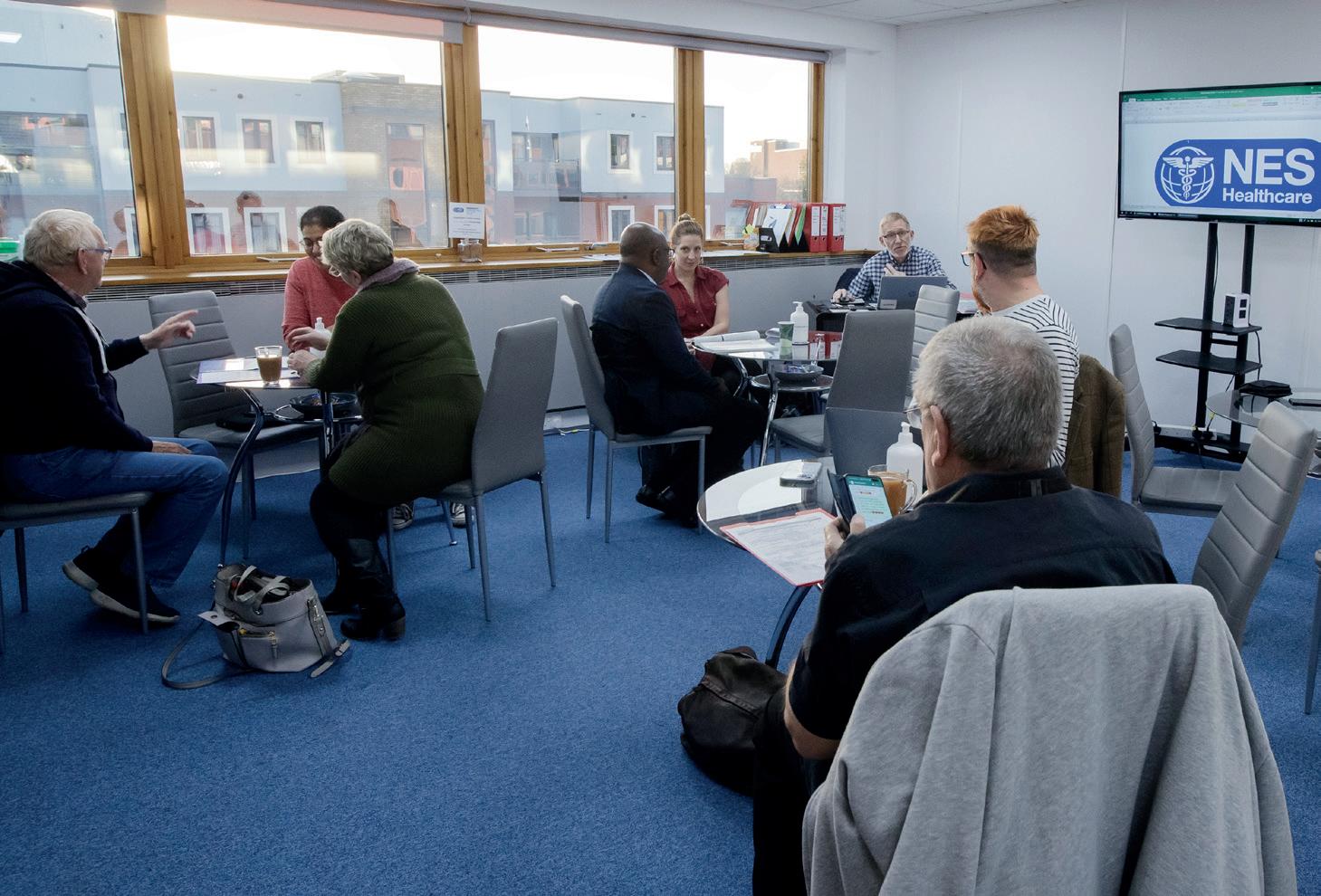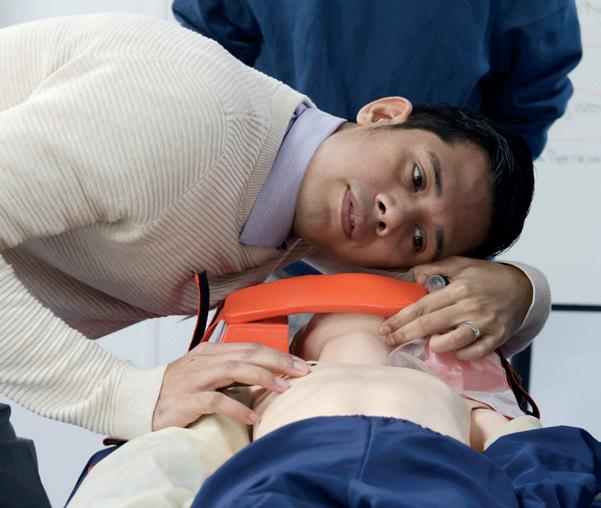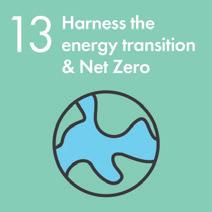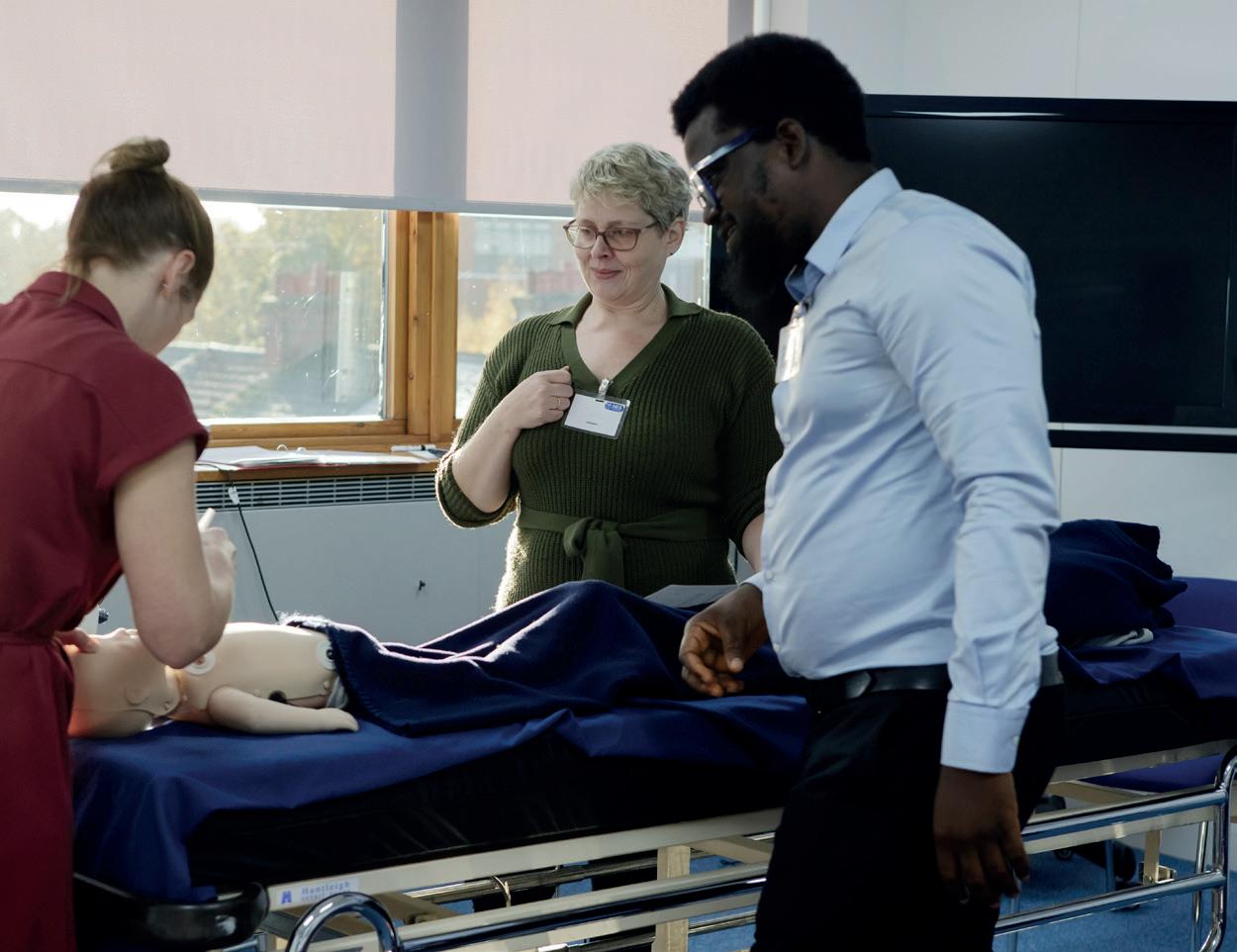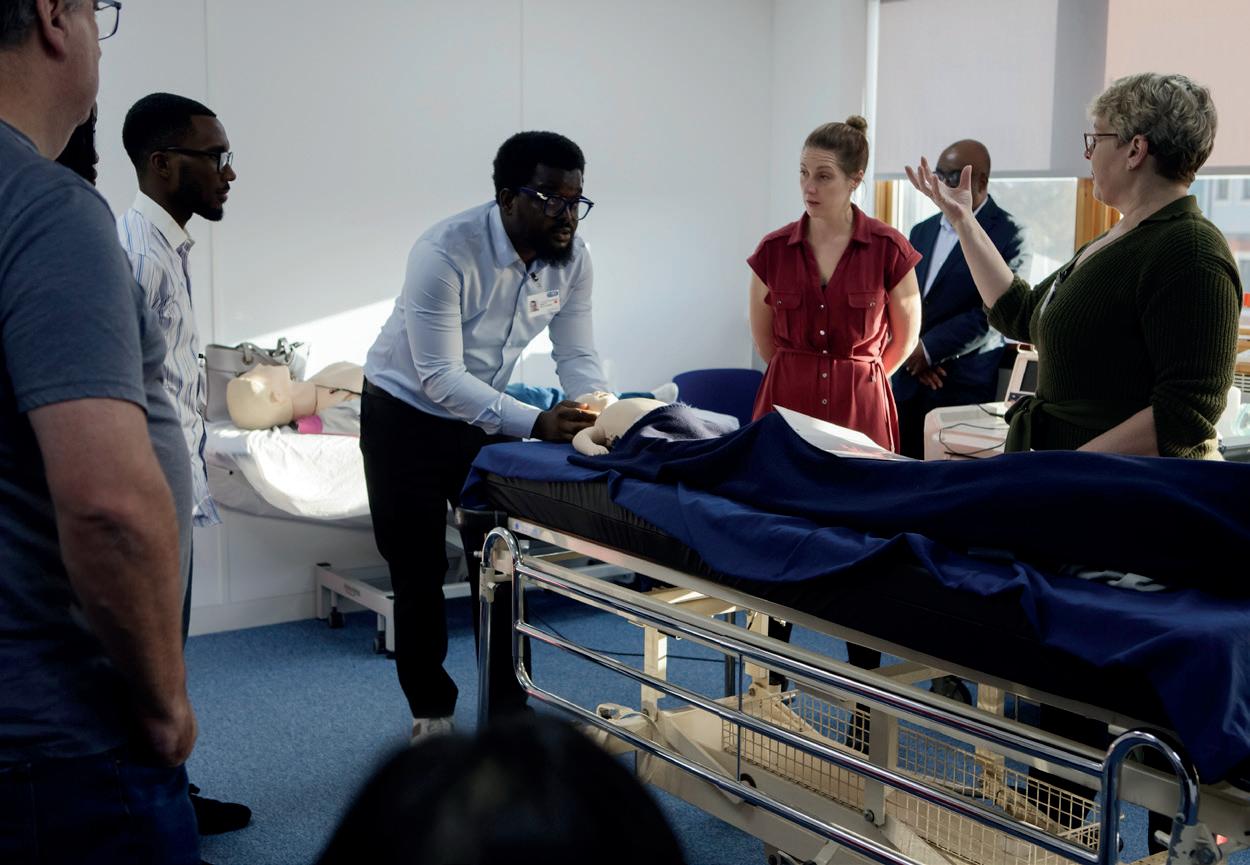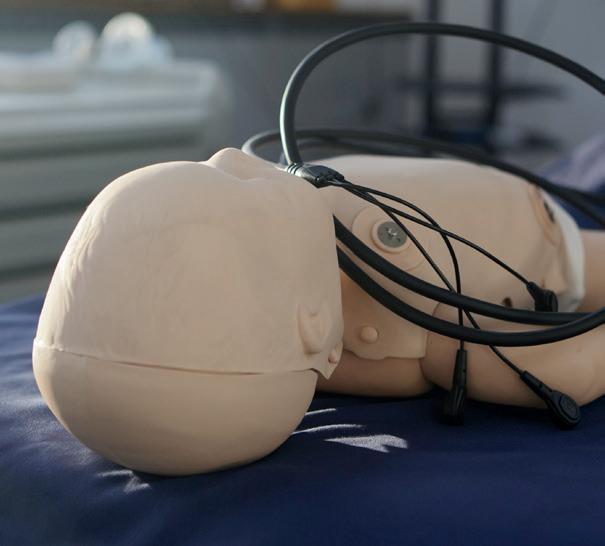1. An Introduction to NES Healthcare and its Place in the Healthcare Ecosystem
1.1. Background to NES
NES Healthcare is a purpose-led leader within the UK’s medical sector, specialising in the provision of managed doctor services.
With a robust presence in nearly 200 hospitals and clinics nationwide, NES has solidified its position in the market, particularly in the placement and management of International Medical Graduates (IMGs).
The organisation’s established pathways critically assist hundreds of doctors annually in starting their careers in the UK.
NES’ hospital partnership approach is underpinned by a comprehensive enrolment and training pathway. Since the opening of its Doctor Training Centre in 2007, NES has led efforts to drive forward industry standards. Its comprehensive language and clinical assessments for doctors result in reduced incidents – part of a wider organisational commitment to patient safety and care excellence.
Its long-term partnerships with hospitals guarantee the continuity and quality of doctor rotations, providing a dependable and trustworthy service. Critically, its integration of high quality doctors and adoption of alternative staffing methods to address shortages of doctors in strategic areas across the NHS has delivered for patients across Britain.
Clinical governance remains a central feature of NES’ operations, with regular reviews and audits of all aspects of its work. The organisation’s exceptional compliance levels reflect the dedication of its experienced team, reinforcing its status as a trusted clinical staffing partner.
Under the leadership of Managing Director Peter Sheppard, NES continuously invests in the development of systems and processes to maintain its service quality.
NES has continued to innovate, including the expansion of its comprehensive training and assessment for applicants, online English testing, an in-house medical English exam, and the adaptation of staffing models for NHS rotations.
NES’ commitment is evidenced by its longstanding ISO accreditation. In 1994, it became the first company in its field to achieve BS EN ISO 9002 Certification and has since transitioned to ISO 9001:2015. This accreditation underlines NES’ dedication to putting patients first in its focus on quality healthcare.
NES’ excellence has been recognised with several awards, including the 2013 Laing & Buisson Independent Healthcare Award for Excellence in Risk Management, and a finalist position at the 2021 Laing & Buisson awards for Excellence in Training.
Throughout this Breaking Down Barriers to Healthcare Impact Report, NES’ role in the wider healthcare ecosystem, its delivery of social impact to key stakeholders, and wider best practice will be benchmarked – culminating in a number of strategic recommendations identifying where the organisation could go even further.
NES continuously invests in the development of systems and processes to maintain its service quality.
1.2. Breaking Down Britain’s Barriers
The Patients First Coalition, as part of the Purpose Coalition, measures organisations against a set of sector-relevant social impact criteria. The Purpose Goals outline 15 interconnected impact barriers to opportunity. By drawing on expertise provided by academia and business, the goals are designed to specifically address some of the unique challenges facing the UK.
The Coalition’s cross-party work brings together the UK’s most innovative leaders, Parliamentarians and businesses to improve, share best practice, and develop solutions for improving the role that organisations can play for their customers, colleagues and communities by breaking down the barriers to opportunity.
The Purpose Coalition is chaired by Rt Hon Justine Greening, the UK’s former Secretary of State for Education, Transport and International Development; and led by Nick Forbes CBE, who recently served in Sir Keir Starmer’s Shadow Cabinet, who leads the Purpose Coalition’s work with the Labour Party; Rt Hon Anne Milton, former Minister for Apprenticeships and a Minister in the Department for Health and Social Care; and Lord Walney, former No 10 Advisor to Gordon Brown and Labour Member of Parliament for Barrow and Furness. Integral to the development of the Coalition has also been Rt Hon Jacqui Smith as Chair of Barts Health NHS Foundation Trust, and now Minister for Skills, Further and Higher Education in Sir Keir Starmer’s government.
The Goals were designed following Justine Greening’s experience - as Secretary of State for International Development - leading the UK’s delegation to the convention of the United Nations (UN) that established the 2015 UN Sustainable Development Goals (SDGs). The Purpose Goals apply the SDGs in a UK context.
The SDGs as interlinked goals emphasised the interdependent environmental, social, and economic aspects of development and centralised the role of sustainability. At the time, Justine recognised how transformative a common set of accessible but ambitious goals could be in galvanising action to effect change. After leaving Government in 2019, Justine established the
Purpose Coalition and Social Mobility Pledge with the intention of galvanising UK economic and social actors to improve social mobility in the UK.
The Purpose Goals focus on key life stages and highlight the main issues that need to be resolved to break down barriers to opportunity in the UK. The Goals are intended to guide ambition, provoke action, and measure progress.
NES Healthcare is active across all 15 Purpose Goals but is specifically focused on five specific areas of the most impact in its area of expertise – strategically sourcing, training, and placing doctors in areas of strategic need across the healthcare ecosystem.
1.3. NES’ Place in the Healthcare Ecosystem
The healthcare system across the UK has faced a period of significant challenge that has directly impacted the provision of essential services. As the nation emerges from a critical General Election and a change of Government, the years of increasing waiting times and broader challenges facing services remain a top concern for communities across Britain.
The NHS elective waiting list in England has been a growing issue, exacerbated by the COVID-19 pandemic. Even before the pandemic, the waiting list had doubled over a decade, increasing from 2.3 million in January 2010 to 4.6 million in December 2019. By September 2023, the waiting list peaked at 7.8 million, displaying a rapid increase over the pandemic. Although the waiting list fell slightly to 7.6 million by December 2023, reflecting both seasonal trends and increased treatment volumes, the NHS remains under significant pressure.
Unfortunately, the NHS and the government have consistently failed to meet their waiting list and time targets since 2010, with many of these targets unlikely to be achieved soon.
One of the challenges the NHS faces is an acute shortage of doctors, significantly contributing to these waiting times.
The latest research from the Kings Fund shows that in the NHS, there are now 121,000 full-time equivalent vacancies, and only 26% of clinical workers feel there are enough staff in their organisation. This high vacancy rate creates a cycle - shortages produce environments of chronic stress, increasing pressure on existing staff, which in turn encourages higher turnover and absence rates.
In comparison to other nations, England has a low proportion of doctors relative to its population. The average number of doctors per 1,000 people in OECD EU nations is 3.7, but England has just 2.9. Germany, by comparison, has 4.3. England needs nearly 50,000 additional full-time equivalent (FTE) doctors to match the OECD EU average. Not a single region in the country meets the OECD EU nation average of 3.7 doctors per 1,000 people. Regions with large populations, like the Midlands, have 4,000 fewer doctors than required to meet their population’s needs.
The workforce crisis both causes and worsens rising stress, fatigue, and burnout among NHS staff, impacting retention. Mental health issues are the highest reported cause of sickness absence in secondary care. The COVID-19 pandemic has had lasting effects on the mental health of doctors, with many reporting increased levels of depression, anxiety, and burnout. Violence and abuse directed at NHS staff is also a growing issue, with more than half of UK doctors experiencing or witnessing verbal or physical abuse in 2022.
The latest research from the Kings Fund shows that in the NHS, there are now 121,000 full-time equivalent vacancies, and only 26% of clinical workers feel there are enough staff in their organisation.
Like the general population, the healthcare workforce is ageing, with 13% of secondary care doctors and 18% of GPs reaching the minimum retirement age in the next one to ten years. This could mean a loss of over 25,000 doctors through retirement alone. The number of doctors taking early retirement from the NHS has more than trebled over the past 13 years, with stress from working during the pandemic potentially increasing this trend.
In response to these challenges, the NHS has announced measures to improve the working lives of doctors. This includes improving rota flexibility, reducing payroll errors, and minimising the administrative burden on postgraduate doctors in training, who move between trusts at least twice a year.
The NHS also aims to cut the time burden for statutory and mandatory training, freeing up more time for patient care. It has wider plans to explore rolling out Lead Employer Models to provide each doctor with a single lead employer throughout their training and implementing new payroll governance to reduce errors.
Despite these efforts, the need for immediate relief remains critical, which is where NES Healthcare plays a critical role.
NES is the UK’s market leader in managed doctor services, working with nearly 200 hospitals and
clinics nationwide. NES doctors provide a reliable and continuous supply of doctors, particularly the IMGs, who are essential in filling the gaps in the healthcare workforce.
Since its establishment, NES has been an important partner in improving industry standards through its Training Centre, commitment to language and clinical assessments, and rigorous enrolment pathways.
NES Healthcare’s contributions are crucial in mitigating the immediate pressures on the NHS. Its initiatives, including the NES Standby Programme, ensure that doctors are always available to respond to emergencies, supporting the continuity of care and improving patient outcomes. By providing a steady supply of well-trained doctors and maintaining high standards, NES helps alleviate the strains on the healthcare system, ensuring patients receive the care they need.
2. Benchmarking NES Healthcare’s Activity Against the Purpose Goals
NES Healthcare, in partnership with the Patients First Coalition, has committed itself to being assessed against the most relevant Purpose Goals. Throughout this section, its current activity will be benchmarked against five key Goals, identifying areas of best practice and opportunity gaps where NES can scale-up its impact even further.
2.1. Purpose Goal 4 – Right Advice and Experiences
Access to the right advice and experiences at the right time can help to unlock opportunity throughout a person’s life.
Getting great access to career advice and the chance for those wider experiences that broaden horizons and set schoolwork in context are vital. It really makes the difference between a young person being able to know about opportunity and then understand the steps towards it and not. Working out how we can consistently provide high quality careers advice, support, mentoring and access to work experience is a vital step in improving social mobility.
For purpose-led organisations like NES, offering timely advice and valuable experiences is essential for unlocking opportunities and shaping futures. Providing robust career guidance, mentoring, and work experience – along with proactive and open career opportunities - is critical in helping young people recognise and navigate their potential paths. This approach not only broadens their horizons but also breaks down the barriers to opportunity by ensuring they have the knowledge and support to pursue opportunities effectively.
2.1.1. Doctor Training and Development
NES Healthcare is dedicated to improving the quality of healthcare services through its comprehensive doctor training and development programmes. Underpinning its training and development agenda is the NES Training Academy, which ensures its commitment to excellence and continuous improvement in medical care is felt through its doctors.
Since 2015, the NES Training Centre in Aylesbury has been a hub for advancing medical education.
Conveniently located in the town centre, this features a large lecture theatre and four fully equipped training rooms, accommodating up to 24 candidates at a time. This capacity allows NES to provide intensive and high-quality training sessions, ensuring that doctors are well-prepared for their roles.
The NES Training Academy is led by highly qualified medical professionals dedicated to delivering quality education. Accredited by the UK Resuscitation Council, the Training Centre conducts both adult and paediatric courses, ensuring doctors are equipped with critical life-saving skills.
Significant investment has been made to provide doctors with the latest equipment and devices used in client hospitals, including cannulas, vacutainers, blood tubes, and masks. This hands-on experience with current medical tools ensures that NES-trained doctors are proficient and confident in their practical skills.
NES’ training programmes include a variety of courses including resuscitation scenarios and introducing doctors to the UK appraisal process. These courses not only meet the mandatory training requirements but also support doctors in obtaining critical Continuing Professional Development (CPD) points, essential for their revalidation within the first five years of practice.
The Advanced Life Support (ALS) and European Paediatric Advanced Life Support (EPALS) courses are ongoing over four years and are crucial for the broader development of doctors. NES doctors are also granted affiliate membership of the Royal College of Surgeons, the benefits of which include free access to the library.
NES Healthcare’s training programmes enable doctors to earn various qualifications across disciplines, including specialised training or general practice. This comprehensive training and development framework not only enhances the quality of healthcare delivery across Britain but also fosters a supportive and enriching environment for doctors.
2.1.2. Fostering Wider Skills
Recognising that many NES doctors come from overseas, the organisation provides bespoke training tailored to enhance their softer skills, which are vital for effective integration into the UK healthcare system, and their continued career development.
This includes training on patient interaction, integration with consultants, and general communication styles. This training ensures that doctors are not only clinically proficient but also culturally and socially adept, which benefits the public sector beyond their tenure with NES.
A vital aspect of NES’ training approach is the shadowing programme, which allows new doctors to spend dedicated time with an NES colleague in the hospital where they will be seconded to provide medical services. This week-long shadowing period facilitates better integration and communication, while also providing leadership experience for the incumbent doctor.
This initiative supports smoother transitions into new roles and improves overall team cohesion.
In addition to mandatory training, which includes 20 specific modules, NES offers a total of 133 training modules. These additional modules allow doctors to expand their knowledge and reach their full potential.
The scenario-based training covers both clinical and non-clinical aspects, offering broader life skills that ease the transition into life in the UK and improve social mobility among the doctor population.
By equipping doctors with the wider skills and knowledge needed to excel, NES Healthcare ensures it is going above and beyond what is expected of independent healthcare organisations in terms of social impactputting patients first and adding value to the wider UK healthcare ecosystem.
2.1.3.
Enrolment Process
NES Healthcare has established a robust enrolment process to ensure a consistent and reliable provision of high-quality medical professionals.
With a dedicated Medical Resourcing Team based in the UK, NES sources doctors from all over the world, receiving applications from a diverse range of nationalities every year.
The enrolment process at NES is meticulous and typically spans six months or more. This extended period ensures that each doctor is thoroughly assessed and deemed suitable to work in the UK.
The comprehensive stages of enrolment include:
• Medical English screening test
• Telephone assessment
• CV review by the clinical team
• Evidence of completion of key skills
• Mandatory training
• Training and assessment courses
• Practical interview
At any stage, if a doctor does not meet the required standards, their enrolment process can be halted. This rigorous approach has successfully enrolled over 750 doctors in the last five years, outlining the efficacy of NES’ enrolment programme.
NES’ enrolment process is uniquely personal. Unlike many organisations, NES does not use third parties or agencies, ensuring direct 1:1 contact with each doctor throughout the process. From the very first day, doctors receive full support from a dedicated NES Medical Resourcing Consultant. This personal touch helps doctors establish a strong relationship with NES colleagues, making the process smoother and more reassuring.
As an industry leader, NES also collaborates regularly with the General Medical Council (GMC)
to create effective pathways for skilled work for asylum-seeking and refugee doctors. If a doctor struggles with gaining GMC registration, NES maintains contact and continues to support them, demonstrating its commitment to their professional journey.
The support provided by NES throughout the GMC process is crucial, given its often arduous and intensive nature. NES’ three-part process for international doctors begins with an English language exam, followed by two more exams.
Each year, NES recruits around 150 doctors through this process, receiving consistently positive feedback from participants. NES’ brand recognition across the sector worldwide results in a highly sustainable resourcing pipeline, with doctors being identified for vacancies between 6 and 12 months in advance.
The UK’s exit from the EU necessitated a shift in resourcing focus, prompting NES to transform its approach to adapt to new circumstances.
Upon arrival in the UK, doctors undergo an appraisal process within the first 3-6 months, ensuring their mental and physical wellbeing and promoting further skills development. This holistic approach to employment and ongoing support is central in NES’ dedication to the professional growth and integration of its doctors.
The NES enrolment process not only ensures a steady supply of qualified doctors but also contributes wider social impact, breaking down the barriers to healthcare for doctors around the world.
By providing comprehensive support and training, NES helps international doctors integrate smoothly into the UK healthcare system, improving social mobility and fostering a diverse, skilled workforce. This commitment to ethical resourcing and professional development enhances the quality of care provided to patients at a time of great need in across the health system.
2.2. Purpose Goal 8 – Good Health and Wellbeing
Improving mental and physical health at all ages is vital to boosting overall wellbeing to allow people to fulfil their potential.
Health and wellbeing inequalities lie at the heart of improving social mobility across the UK. Good health and wellbeing are often a precursor to a person being able to make the most of their talents and in work, feel they can consider taking the next step in their career. The recent years have shone a stark light on the health inequalities our country has and how they impact on wider life. The statistics on diverging life expectancy give a clear sense of how communities even living side by side can have very different outcomes.
For one of the UK’s leading doctor providers, this focus is central to its mission. NES Healthcare is dedicated to providing a pathway of doctors into the healthcare ecosystem right across the UK, in strategic areas of most need.
NES’ commitment to health and wellbeing extends to its non-clinical employees as well. The organisation understands that a healthy, well-supported workforce is essential for delivering excellent patient care. By investing in the mental and physical health of its staff, NES ensures that its team and its doctors can perform at their best, fostering a positive and productive work environment.
2.2.1. Support Team
In 2022, NES Healthcare established its dedicated Clinical Support Team to address the critical need for pastoral support among its doctors, particularly those from overseas. Recognising that many of these doctors are embarking on their first professional roles in the UK, NES has created an extensive support system to ensure a smooth transition and ongoing wellbeing.
This Clinical Support Team represents an essential adjunct to the existing Medical Staffing Team, which has historically played a critical role in the NES doctor pathway, providing both clinical and pastoral support that is often unavailable in other organisations.
Support from the Medical Staffing Team begins with detailed travel plans and continues with regular check-ins with both the doctors and the hospitals where they are placed. Given that many doctors initially leave their families behind, the wellbeing and wider day-to-day support provided by NES is essential.
The Medical Staffing Manager, a key figure within NES, is responsible for ensuring that doctors receive the necessary support to navigate their new environment.
If any issues arise, the team follows an established escalation process to address and resolve problems swiftly. This structured approach ensures that doctors feel supported and can focus on
their clinical duties without unnecessary stress. The Medical Staffing Team is highly proactive, aiming to conduct an impressive 480 calls per month with its doctors. These regular check-ins help maintain open communication and address any concerns promptly. Every six months, the team also completes an immigration check for each doctor to ensure compliance with UK work regulations.
To further support the wellbeing of their doctors, the Medical Staffing Team holds weekly welfare meetings with the Clinical Support Team to assess the overall welfare and identify any specific needs of individual doctors.
NES also offers a 24-hour on-call service operated by the Medical Staffing Managers. This provides around-the-clock support for doctors whenever it is needed.
The Medical Staffing Manager, a key figure within NES, is responsible for ensuring that doctors receive the necessary support to navigate their new environment.
The ongoing efforts of the support teams highlight NES Healthcare’s commitment to providing comprehensive clinical and non-clinical support. This initiative not only enhances the professional experience of NES doctors but also contributes to their overall wellbeing, thereby improving the quality of care they provide to patients.
These efforts ensure that NES doctors are well-supported, compliant, and integrated, which is a testament to the organisation’s wider dedication to its workforce and wider focus on social impact.
2.2.2. Supporting its doctors
NES Healthcare takes a comprehensive approach to supporting the health and wellbeing of its doctors, particularly those facing unique challenges including pregnancy, parenthood, or disabilities. This commitment not only improves the quality of life for its doctors but also contributes to NES Healthcare’s contribution to the quality-ofcare provision across the sector.
A key component of NES Healthcare’s support system is its focus on doctors who are pregnant or caring for young children. Recognising the additional demands these doctors face, NES provides tailored support to ensure their professional and personal needs are met. This includes flexible working arrangements wherever possible and specific health and wellbeing resources to help them balance their responsibilities effectively.
NES Healthcare is also proactive in addressing mental health needs. The organisation is actively training mental health first aiders among its staff to ensure that doctors receive the most effective support possible. This initiative is crucial in helping doctors manage stress, anxiety, and other mental health challenges, particularly during the initial transition period when moving to the UK.
All NES doctors have direct access to an emergency line that connects them to NES support staff 24/7. This round-the-clock service is especially important during the first few months of a doctor’s arrival in the UK, providing immediate assistance and reassurance whenever needed.
The Resident Doctor Forum is another vital platform for supporting doctor wellbeing at NES. The Forum allows doctors to anonymously raise issues related to remuneration, role changes, and benefits. This has proven instrumental in advocating for better conditions, such as securing the Blue Light discount for all NES doctors.
By empowering doctors and giving them a voice, the Forum ensures their concerns are heard and addressed, fostering a more supportive and responsive working environment.
NES Healthcare also partners with MediGold to provide comprehensive occupational health support. This partnership ensures that all doctors undergo thorough health checks, both from their home countries and upon arrival in the UK. These checks not only confirm the doctors' fitness to work but also offer ongoing welfare support. This is particularly crucial for doctors with disabilities or other health challenges, as it ensures they receive the necessary support to perform their roles effectively.
By providing such extensive support, NES Healthcare helps break down barriers to opportunity, allowing all doctors, regardless of their personal circumstances, to thrive in their roles. This approach not only benefits the doctors but also enhances the overall quality of care provided to patients. Through its comprehensive support system, NES Healthcare ensures that its doctors are healthy, well-supported, and able to deliver the highest standard of care.
2.2.3. Supporting Wellbeing externally through the Parkinson’s Committee
NES Healthcare’s commitment to boosting health and wellbeing extends beyond its immediate workforce and into the broader community. A notable example of this is NES Healthcare’s support of a local Parkinson’s Committee.
NES opens its office Aylesbury office to the local Parkinson’s Committee, allowing them to hold their meetings in a comfortable and accessible environment.
Before this arrangement, the Committee met in a different building which posed several challenges. The location had access issues for some members, particularly those living with Parkinson’s, and the background noise made it difficult for attendees to hear discussions clearly. Additionally, the financial cost of the meetings previously was a burden for the committee.
In providing its office space, NES Healthcare has significantly improved the Committee’s ability to meet and operate effectively. The office offers easy access and ample parking, ensuring that all members, including those with mobility issues, can attend meetings without difficulty.
This support from NES Healthcare is invaluable to the Parkinson’s Committee, as highlighted by their feedback:
“As far as the committee room is concerned, it has been a godsend to us. As you know, there are one or two on the committee who have Parkinson’s and previously we have had access problems and, in one place, there was quite a bit of background noise which meant that they found it difficult to hear properly.
NES is easy access and parking, exactly the right size, tea and coffee available (we are very happy to serve ourselves but the service from you is fantastic!!) and very, very comfortable. We would really struggle to find anywhere which meets our needs so well.”
This reflects NES Healthcare’s broader mission to support health and wellbeing across the communities it operates in.
2.3. Purpose Goal 12 – Building Sustainable Communities
A lack of safe, sustainable communities is one of the major barriers to opportunity.
Communities that are safe, with a good quality of life and homes people can afford are communities that are sustainable in the long run. For communities that aren’t, they risk losing their talent and driving away the very opportunities from business investment that could transform their fortunes. It’s why place-based approaches matter so much, both from the government but also from businesses.
2.3.1. Community and Charity Partnerships
NES Healthcare’s Charity and Community Partnerships are a cornerstone of its commitment to wider social impact, demonstrating the organisation’s dedication to making a positive difference both locally and nationally.
Each year, NES staff have the opportunity to nominate specific charities they wish to support. The chosen charity is then promoted and supported throughout the year. In 2024, NES Healthcare is proud to be linked with Women’s Aid, a vital organisation dedicated to supporting women and children affected by domestic abuse.
In 2023, NES Healthcare demonstrated its commitment to its charity agenda by making a sizeable donation for Parkinson’s UK through a combination of staff and company donations. This substantial contribution is evidence of the organisation’s ongoing commitment to supporting critical health-related causes.
NES’ support extends beyond annual charity partnerships. The organisation is also very supportive of individual charity initiatives locally, empowering its staff to engage in and promote causes that are important to them. Donations that members of staff raise through their charity initiatives and events are matched by the Company.
Historically, the organisation has supported Médecins Sans Frontières (MSF) due to its global connections, particularly in West Africa. MSF, an international humanitarian organisation, provides medical care in more than 70 countries, treating people caught in complex crises and chronic healthcare emergencies. In 2022 alone, MSF admitted more than 1.2 million people to its hospitals and held over 16.2 million consultations, showcasing its significant impact on global health.
On top of financial support, NES Healthcare is happy to facilitate its colleagues volunteering in critical areas of the world, including Ukraine and Haiti.
The organisation offers a leave of absence to its employees, fully supporting them in their humanitarian efforts. This not only allows NES Healthcare staff to contribute their skills where they are needed most but also reinforces the organisation’s commitment to global health and wellbeing.
NES Healthcare’s extensive involvement in charity and community partnerships highlights its commitment to broader social impact. It supports a number of charitable initiatives and empowers staff to participate in humanitarian work – exemplifying its dedication to improving health and wellbeing on both a local and global scale.
2.3.2. Wider Community Work
NES Healthcare’s commitment to community welfare extends beyond healthcare provision to encompass proactive initiatives that directly benefit the local community.
One of NES Healthcare’s notable contributions is its deployment of defibrillators across its locations in Aylesbury and Norwich. The defibrillator housed at the office in Aylesbury is the most centrally located such device in the town. This ensures rapid access to life-saving treatment in cases of cardiac emergencies, significantly improving community resilience and safety.
In addition to providing essential equipment, NES actively engages its staff in community health schemes. Each year, all staff members undergo training led by clinical professionals as part of Restart a Heart Day. This training equips staff with the skills and knowledge necessary to administer immediate CPR and use defibrillators effectively in emergency situations.
In 2021, NES donated a defibrillator to a local secondary school.
NES is reaching out into the wider community to provide employees of local businesses with life-saving skills, not only improving workplace preparedness but also contributing to broader health and safety awareness in the community.
NES Healthcare’s investment in defibrillators and staff training exemplifies its proactive approach to community engagement and social impact. These initiatives not only strengthen emergency response capabilities locally but also foster a culture of care and preparedness that benefits individuals and families across Aylesbury and Norwich.
2.4. Purpose Goal 13 – Harnessing the Energy Transition and Net-Zero
People and the planet are two sides of the same coin. As we progress further with the energy transition it will become an ever more fundamental part of the debate on opportunity and social impact.
Investment in the green economy is already bringing brand-new opportunities to areas across the country, it’s crucial that the transition is one that is equitable for people and communities everywhere and is championed by businesses like NES.
2.4.1. Commitment to achieving Net Zero Emissions
NES Healthcare is firmly committed to environmental sustainability, aiming to achieve net zero emissions in its operations by 2035 and extend this commitment to its entire supply chain by 2045. This pledge aligns with its membership in the Independent Healthcare Providers Network (IHPN), highlighting NES Healthcare’s proactive stance in mitigating its climate impact.
NES Healthcare’s Carbon Reduction Planestablished in accordance with PPN 06/21 guidelines - outlines its emissions footprint based on rigorous measurement protocols. The baseline year for emissions was set in 2020, with subsequent yearly reports ensuring transparency and accountability.
The organisation’s commitment to annually publishing its Carbon Reduction Plan ensures continuous monitoring and improvement of environmental performance.
This structured approach not only supports NES’ environmental goals but also reinforces its role as a responsible provider dedicated to reducing its carbon footprint.
NES’ work in prioritising sustainability initiatives and embracing carbon reduction strategies demonstrates its wider leadership in environmental stewardship across the sector.
2.4.2. Tracking Emissions against the Net Zero Scopes
NES Healthcare is committed to tracking and reducing its carbon emissions across different scopes as part of its journey towards achieving Net Zero status. By measuring and reporting its emissions annually, NES Healthcare ensures transparency and accountability in its environmental stewardship efforts.
In 2020, NES Healthcare’s total emissions were 112.00 tCO2e, comprising Scope 1 (19.00 tCO2e), Scope 2 (86.00 tCO2e), and Scope 3 (7.00 tCO2e) emissions. These emissions primarily stemmed from business travel (4.76 tCO2e), employee commuting (1.97 tCO2e), and other operational sources.
By 2023, NES Healthcare had made strides in reducing its carbon footprint, with total emissions decreasing to 52.10 tCO2e. This reduction reflects ongoing efforts across Scope 1 (18.68 tCO2e), Scope 2 (7.04 tCO2e), and Scope 3 (26.38 tCO2e) categories. Key contributors included business travel (16.42 tCO2e) and employee commuting (8.74 tCO2e).
Scope 1 emissions primarily stem from the mileage travelled by the company’s fleet. NES does not have boilers, on-site manufacturing, or f-gases that contribute to Scope 1 emissions.
Within Scope 2, NES Healthcare measures emissions from activities such as working from home and the consumption of purchased gas and electricity in its offices. With 59 employees embracing hybrid working, NES calculates emissions considering that two out of five working days are spent from home, accounting for factors like heating, lighting, and computer consumption.
Scope 3 emissions include categories such as Business Travel, Employee Commuting, Upstream and Downstream Transportation, and Waste Generated in Operations. Business Travel emissions in 2023 were comprehensively quantified, encompassing various modes of transportation including taxi, rail, bus, flights, and employee-owned vehicles used for business purposes.
Employee Commuting emissions were calculated at 8.74 tCO2e, factoring in distances travelled and transportation modes.
Upstream Transportation and Distribution emissions were measured at 1.15 tCO2e, considering the transportation activities involved in sourcing materials. NES does not distribute goods downstream, thus reporting 0.00 tCO2e for Downstream Transportation and Distribution.
Waste Generated in Operations, managed by local council collections, does not provide specific CO2e emissions data due to its minimal impact.
NES Healthcare has set ambitious emissions reduction targets to further its progress towards Net Zero. By 2029, NES aims to reduce its carbon emissions to 41.68 tCO2e, marking a 20% reduction from its 2023 baseline.
Through rigorous tracking, transparent reporting, and targeted reduction strategies, NES Healthcare demonstrates its commitment to environmental responsibility while advancing towards a greener future in healthcare.
2.4.3. Carbon Reduction Projects
NES Healthcare has implemented a series of proactive Carbon Reduction Projects aimed at mitigating its environmental impact while enhancing its social responsibility initiatives. These measures align with NES’ commitment to achieving net-zero emissions and promoting sustainability within its operations.
One significant initiative undertaken by NES Healthcare is the sourcing of renewable energy. It has prioritised transitioning to renewable s ources, reducing its carbon footprint and supporting cleaner energy production, contributing positively to environmental health.
The adoption of hybrid working practices represents another key initiative. With a significant portion of its workforce embracing remote work, NES reduces the need for daily commuting and associated carbon emissions. This shift not only improves employee flexibility and the colleague offering but also promotes a greener approach to business operations.
NES has also made strategic decisions in office space management. By relocating to a more efficient office space centrally located within town centres, NES minimises travel requirements for staff and visitors. This move reduces transportation-related emissions and supports local community integration.
To optimise energy consumption within its facilities, NES has implemented improvements such as sensory-controlled lighting and automatic lighting controls. These measures ensure energy is used more efficiently, lowering overall consumption and operational carbon footprint.
NES actively encourages staff to use public transport through incentives and awareness programmes.
It promotes sustainable transport options, reducing individual carbon footprints and supporting broader environmental conservation efforts.
In alignment with its commitment to greener transportation, NES Healthcare is researching and considering the adoption of electric vehicles (EVs) within its fleet. This initiative aims to further reduce emissions associated with business travel and logistics.
Recognising the importance of alternative commuting methods, NES provides bike facilities to staff, promoting cycling as a sustainable mode of transport. This initiative not only reduces carbon emissions but also supports employee health and wellbeing.
NES Healthcare has implemented a comprehensive Reduce, Reuse, Recycle Policy to minimise paper waste and promote responsible resource management across its operations. Introducing Virtual Communication (VC) technologies has further supported NES’ carbon reduction goals by reducing the need for business travel. It has facilitated virtual meetings and communications, decreasing business miles and associated emissions, demonstrating its commitment to sustainability and carbon footprint reduction.
Through these Carbon Reduction Projects, NES Healthcare not only strives to achieve its environmental goals but also actively contributes to broader social impact initiatives.
NES Healthcare sets a precedent for sustainable healthcare operations that benefit both the community and the planet.
By promoting sustainable practices, reducing carbon emissions, and fostering a culture of environmental responsibility, NES Healthcare sets a precedent for sustainable healthcare operations that benefit both the community and the planet.
2.5. Purpose Goal 15 – Working in Partnership
It is critical organisations across both the public and private sector are working in partnership to boost opportunity and deliver for communities across the country.
By fostering strategic place-based alliances with sector-specific aims, organisations can harness diverse talent and perspectives, and ensure their initiatives are grounded in the needs of real-world communities.
2.5.1. Working in collaboration with the NHS
NES Healthcare’s collaboration with the NHS is critical to its organisational purpose in enhancing patient care and addressing critical staffing needs within the sector.
Through strategic partnerships and innovative service models, NES Healthcare plays a pivotal role in supporting NHS Trusts, delivering social impact, and prioritising patient welfare.
Since the 1990s, NES has collaborated closely with NHS hospitals, facilitating over well over 3000 doctor placements directly into NHS roles over the past decade. These placements encompass diverse specialisations such as GP training and specific medical disciplines, fostering career development and expertise within the NHS workforce.
Central to NES Healthcare’s impact is its managed-service model, currently adopted by 12 NHS Trusts to mitigate acute staffing shortages effectively. Through this model, NES provides a reliable and cost-efficient alternative to traditional locum agency cover, ensuring continuity of care and operational stability within healthcare facilities.
In 2023 alone, NES doctors delivered over 230,000 hours of medical services across these Trusts, underscoring the breadth of its contribution to patient care.
Approximately 40% of NES doctors are directly seconded within the NHS, strategically supporting Trusts through targeted partnerships. This includes initiatives like the winter pressures scheme, where NES deploys doctors to Trusts facing heightened seasonal demands, ensuring adequate healthcare provision during critical periods.
NES operates a flexible resourcing pipeline tailored to the evolving needs of the NHS. During the COVID-19 pandemic, for instance, NES swiftly responded to the increased demand for doctors with anaesthesia expertise by expanding its strategic resourcing efforts. This agile response ensured that essential medical services were maintained amidst unprecedented healthcare challenges.
In 2023 alone, NES doctors delivered over 230,000 hours of medical services across these Trusts, underscoring the breadth of its contribution to patient care.
A key initiative by NES has been the development of a consistent psychiatric doctor resource, facilitating the placement of doctors who go on to similar roles across the NHS where there is an acute shortage. This not only addresses specific healthcare shortages but also improves mental health services within communities, benefiting patients directly.
NES Healthcare’s role extends beyond staffing solutions; during the pandemic, NES emerged as a leading provider of Advanced Life Support training for NHS personnel, undertaking almost 50% of the UK’s training of NHS instructors and clinicians at this time. This initiative was pivotal in augmenting the healthcare system’s capacity amidst resource constraints, highlighting NES’ integral support in strengthening the NHS workforce.
The instructor training the NES provides will help to equip the NHS with Advanced Life Support leaders for patient care today and tomorrow.
In line with this ambition NES hosted the Generic Instructor Proof of Concept course in August 2024. This event helped to facilitate the training of all future UK instructors for:
• Advanced Life Support (ALS)
• Advanced Paediatric Life Support (APLS)
• European Paediatric Advanced Life Support (EPALS)
• Newborn Life Support (NLS)
• Advanced Resuscitation of the Newborn Infant (ARNI)
• Major Incident Medical Management and Support (MIMMS & HMIMMS)
• European Trauma Course (ETC)
Operationalising these partnerships involves NES identifying specific staffing needs within NHS Trusts and sourcing, assessing, and training doctors accordingly. NES doctors work within structured rotations aligned with patient care needs, ensuring continuity and reliability akin to directly employed hospital staff. NES manages all aspects of employment, including holiday cover and emergency replacements, while providing ongoing training and appraisal to support timely revalidation for doctors.
NES Healthcare’s service is designed to be costeffective, offering stable rotas and predictable monthly billing that is significantly more economical than traditional locum agency rates. This approach not only enhances financial efficiency for NHS Trusts but also ensures sustained service delivery and patient care excellence.
The organisation’s collaborative efforts with the NHS demonstrates its pivotal role in enhancing healthcare provision, addressing critical staffing needs, and ultimately prioritising patient welfare. In delivering innovative service models and fostering enduring partnerships, NES Healthcare continues to drive positive social impact within the healthcare sector, ensuring comprehensive support for patients across the UK.
2.5.2. Hospital Partnership Case Study
In July 2016, a senior clinician working in orthopaedics at the East Kent University Hospitals NHS Foundation Trust (EKUHFT) contacted NES Healthcare with a view to “exploring new staffing models that are sustainable for the future”.
The primary purposes in looking at innovative approaches to staffing were to address the challenge of recruiting a stable workforce and to reduce the cost of using expensive agency locum doctors to cover gaps in the rotas.
The subsequent discussions resulted in a pilot scheme that commenced in November that year at the William Harvey Hospital in Ashford, Kent. Four NES doctors were seconded to the Trust for a period of six months, during which time they worked in Trauma and Orthopaedics on a regular, recurring rotation pattern.
NES’ work up to this point had primarily been within the Independent Healthcare sector and over the first few weeks of the project there was a great deal of learning on both sides as to how the service could be adapted to a busy NHS department. This learning has been invaluable in the implementation of subsequent projects at other NHS Trusts.
Working in partnership the issues that arose were successfully addressed and on completion of the initial six month period there was a strong desire from both sides to continue with the arrangement. The hospital had experienced greater continuity through having a settled doctor rotation, and the structured contract brought the costs under control.
Having embraced the concept of managed staffing, EKUHFT put the provision out to tender. The requirement however was not just for four doctors to work in orthopaedics; it was in fact expanded to incorporate additional rotations covering two other large hospitals in Margate and Canterbury and to cover General Medicine.
The total requirement in the tender was for a total of 40 doctors.
NES was awarded the contract for this provision and the new services came on line during the second half of 2017.
In the years since then, the service has developed more gradually. At the time of writing NES operates 11 rotations across the 3 large hospitals and covers General Surgery as well as the specialties previously implemented.
NES doctors now provide regular, reliable cover for over 100,000 hours a year at the Trust.
The benefits of this service to the Trust have been seen in the reliability of the doctors, as evidenced by a 99.1% fill rate, continuity of care, which is associated with improved patient outcomes, and the cost saving.
At a conservative estimate, the hours that NES doctors work save the Trust £2.6million a year in locum agency costs.
In 2024 the contract was independently audited by one of the Big 4 accounting firms. The result of this was to conclude that the service came very close to mirroring the costs of EKUHFT employing its own doctors.
A member of the EKUHFT team wrote:
“The NES Healthcare Team of Doctors across the Trust have shown to be very valuable members of the system here at EKHUFT. They are very reliable and have many years’ experience in virtually all medical specialties. There is always an NES doctor every night across the 3 sites in the Trust.
If for any reason (like annual leave) an NES doctor is absent, another one will be called upon to cover. The nursing staff feel very relieved knowing they get an experienced doctor in the ward during out of hours. All of the above generally improves significantly patient outcomes and staff experience. NES doctors are keen to lead and follow in ways that show equality, diversity and inclusion in all their dealings with colleagues, staff and patients (and their relatives).”
At a conservative estimate, the hours that NES doctors work save the Trust £2.6million a year in locum agency costs.
2.5.3. NHS Doctor Pathway
NES Healthcare plays a crucial role in facilitating doctors’ pathways into NHS careers through its approved provider status on the current NHS Framework. This partnership allows NES to offer doctors the opportunity to commence their NHS journeys under structured rotations that mirror the demanding shift patterns typical in NHS settings.
NES doctors in NHS hospitals often work on complex shift patterns designed to meet the rigorous demands of hospital operations. NES ensures that applicants fully understand these work patterns during the application process, tailoring rosters to suit each role effectively.
NES distinguishes itself by offering competitive remuneration packages to its doctors in NHS placements, usually exceeding those of their NHS-employed counterparts. Additionally, NES provides support with accommodation costs, alleviating financial burdens associated with relocating for work.
Typically, NES doctors in NHS hospitals operate at the level equivalent to Senior House Officer (SHO), collaborating closely with NHS staff while employed by NES. The roles are integral to hospital wards, where NES doctors undertake responsibilities and tasks akin to NHS resident doctors, albeit within NES’ employment framework.
The organisation caters to various medical specialties, with current emphasis on orthopaedics, general surgery, and general medicine due to high demand across NHS Trusts. Should the opportunity arise, many of our employees are generalists and could service Accident and Emergency or community centres with patient care. While our roles are not formal training posts, NES doctors’ benefit from participating in training sessions and gaining valuable experience that contributes to their professional development. This experience is recognised should they pursue future applications within the NHS or seek entry into GP training programmes.
Applicants for NES Healthcare’s NHS doctor pathways must meet specific criteria, including
a minimum of three years’ post-registration experience. This experience should include substantial exposure to General Surgery, Trauma & Orthopaedics, or General Medicine patients, along with holding a Primary Medical Qualification and full registration with the General Medical Council (GMC).
NES Healthcare’s collaboration with the NHS in facilitating doctor pathways is underpinned by the organisational purpose in enhancing healthcare delivery, addressing staffing needs, and supporting career progression within the NHS. By providing structured placements, competitive benefits, and opportunities for professional growth, NES Healthcare plays a pivotal role in shaping the future of healthcare professionals across the UK.
